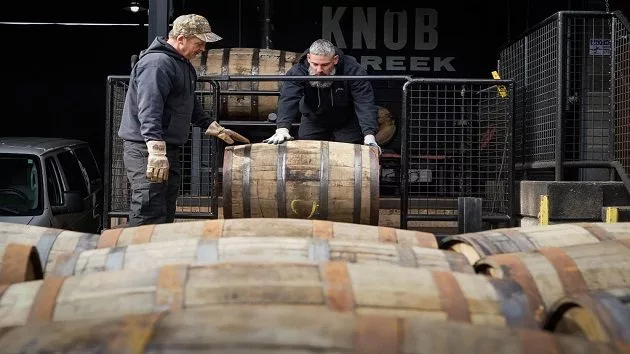
(BELVIDERE, Ill.) — Over a thousand automotive workers in Illinois will clock out of a Jeep assembly plant for the last time Tuesday, stopping what a local union president described as the “heartbeat” of the small city.
In December, multinational automotive giant Stellantis announced that they would be “idling” their Belvidere, Illinois, assembly plant on Feb. 28, indefinitely laying off 1,350 employees. The factory, which had served as an economic engine for the town of Belvidere since the 1960s, also spawned thousands of local jobs; according to a union official, 400 additional jobs for different companies supplying the plant have also been cut due to the factory’s idling.
“It’s like living a nightmare every day,” said Kevin Logan, the president of Belvidere-based United Auto Workers Local 1268.
Stellantis’ decision to leave Belvidere leaves many of the city’s 25,000 residents with an uncertain future, with some former employees driven to relocate to fully obtain benefits and those left behind unsure about the long-term viability of their community without the factory that served as the town’s economic anchor.
“You’re either forced to take a pay cut or uproot your entire family,” said Jeremy Snow, co-owner of an auto-repair shop in Belvidere. He later added, “I just feel like there’s definitely a million ways they could have done better, and they didn’t care.”
Stellantis, which recorded $17.8 billion in net profit in 2022, said it would idle the facility in part because of the increased cost of “the electrification of the automotive market,” in addition to the pandemic and the global microchip shortage. In a statement to ABC News, a company spokesperson said they would make “every effort to place indefinitely laid off employees in open full-time positions as they become available.”
The plant — associated with Chrysler for decades — churned out millions of vehicles, including the Dodge Dart and Chrysler New Yorker. Before its idling, the plant was most recently used to assemble the Jeep Cherokee. According to Logan, the final decision to idle the factory follows a slow bleed of layoffs in the last four years, including the loss of about 1,500 workers in 2019, 1,200 in 2021 and 500 in 2022.
Logan said the “nightmare” began on Dec. 9, when he received a phone call from a Stellantis representative who informed him that in fifteen minutes, an announcement would be made on the plant’s floor telling the employees about the fate of the factory. Since then, Logan said local management has primarily been “kept in the dark” about the factory’s future.
Logan said he was given the same reasons for the factory closure – a combination of the cost of electrification, COVID, and the chip shortage – though he said he struggles to rationalize how such a profitable company, along with the tax incentives for American manufacturing, would still decide to shutter a state-of-the-art facility.
“It really pisses me off that they’re not going to keep it here at this facility,” he said, adding. “They’re turning profits with these companies, yet they aren’t making enough profit to sustain the product here and keep people working.”
In a statement to ABC News, Stellantis said that they have not yet announced the next production location for the next-generation Jeep Cherokee; however, citing internal discussion at the factory, Logan expressed concern that production might move to Stellanti’s 1.6 million-square-foot Toluca, Mexico, assembly plant, where Jeep already produces their Compass compact SUV.
A Stellantis spokesperson said that “government regulations and societal pressure” have led to the push for electrification, which she said is 40 percent more expensive to implement.
“This means we will need to rethink and restructure our operations everywhere in the world, including in North America,” she wrote.
The decision to shutter the factory is also expected to impact suppliers in the town and region, including seven union-staffed facilities that supply tires, headliners, shocks, seats and engines, as well as clean facilities and transport cars. Across these facilities, Logan cited an additional 400 layoffs.
A spokesperson for the Illinois Department of Commerce and Economic Opportunity said the state government is working to assist furloughed workers and identify new opportunities for the Belvidere plant. Stellantis could not provide any details about plans to repurpose the facility.
While the town has other employment opportunities, such as a large General Mills facility, the Stellantis plant’s loss leaves employees and residents with an unstable future, local business owners said.
Some employees could move to another Stellantis plant in neighboring states so they can complete the years of work required to obtain full benefits, as those opportunities become available. The move comes with a relocation bonus, Logan said. But, for many, the prospect of moving their family is a high cost, Snow said.
“Can you imagine an option where you’ve worked for a company for, let’s say, 17, 18 years, when you’re two years away from a pension … and your only option to keep your pension is to move to Toledo, Ohio, 600 miles away, to try to just keep your job,” Snow said.
Snow also cited concerns about property values, arguing that many people originally moved to Belvidere because of the plant. He added that residents have been more reluctant to spend money following the announcement.
“If nothing else, we’re losing long-term relationships with clients because they’ve got to move out of state to find work,” said Joe Santiago, another Belvidere small business owner.
When looking for someone to blame for the plant’s demise, some look directly at Stellantis.
“It feels like we had oil underneath the town, and now the oil is gone, so now they’ve just gonna leave their equipment and leave,” Snow said. “And that’s sort of what it feels like, they’ve drained us, they’re done with us, they don’t care what happens to our market, our families, our children, our schools.”
However, Santiago pointed more toward the high taxes in Illinois, the influence of unions, and the lack of overall business competitiveness in the state, though he added that Stellantis’ moves over the last year have been “haphazard, to say the least.”
“I hear more people who want to move out of state than I see people wanting to come to Illinois to work, which is unfortunate,” he said.
The plant’s closure may serve to further weaken the concept among locals that members of the working class, many of whom don’t have specialized training or a college degree, could rely on a stable manufacturing job as a gateway to a stable life.
“When you grew up in a plant town or around the plant town, everybody always says, ‘Man, if you can get into there, you’re set for life,'” Snow said.
When asked about that idea, Logan chuckled.
“It used to be that way,” he said.
Copyright © 2023, ABC Audio. All rights reserved.








